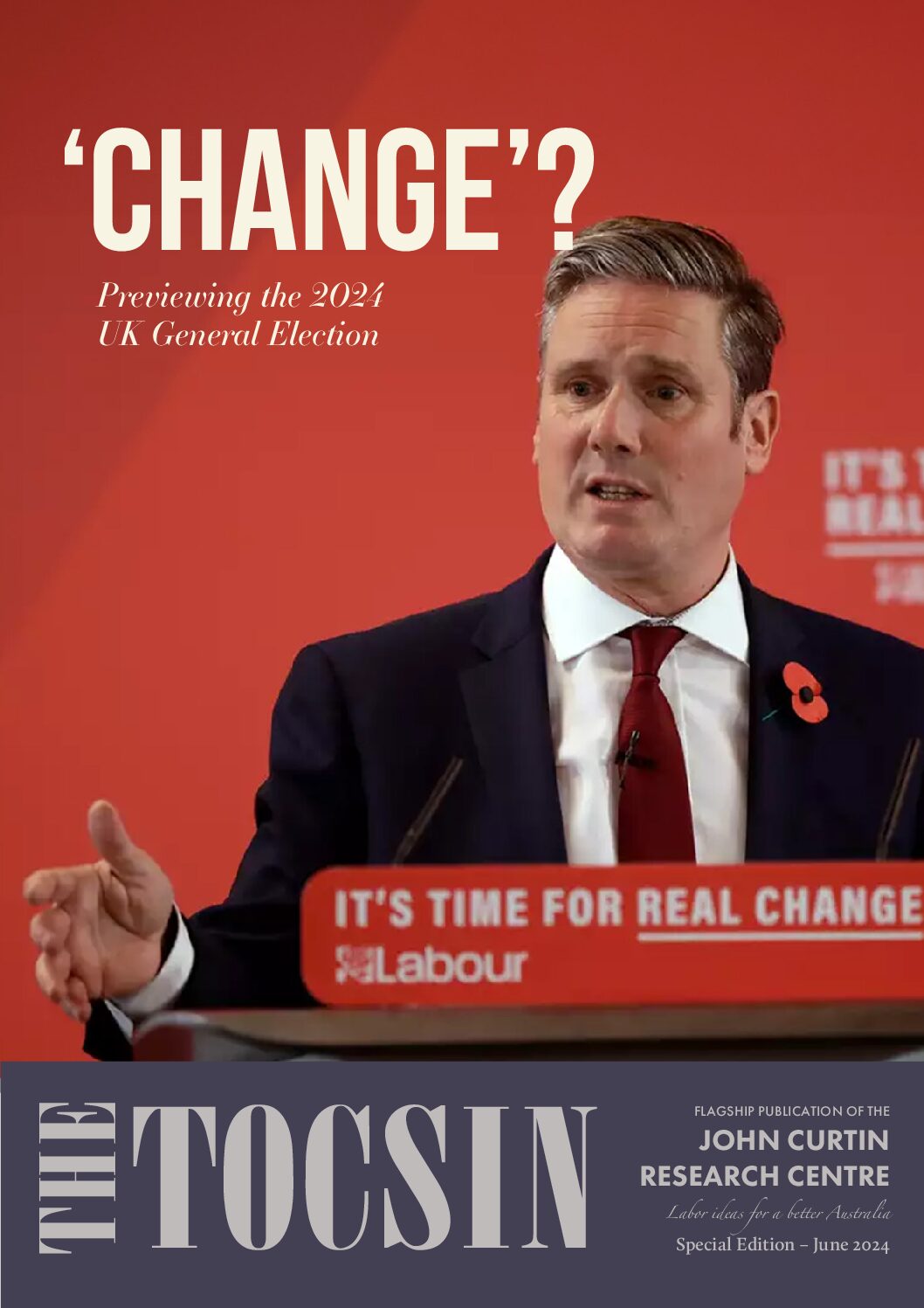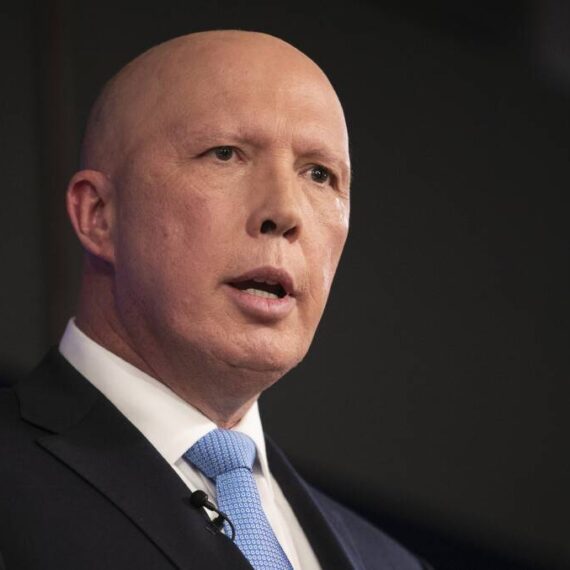The British media personality is the latest libertarian to be mugged by reality
Libertarianism – like European rabbits, US fast-food chain McDonalds and reality television – is a virulent foreign species brought to Australia.
Fortunately, in the case of the British far-right media personality cum libertarian darling Katie Hopkins, imported to appear in Channel 7’s Big Brother, it didn’t last long. Hopkins has previously called for a “final solution” towards British Muslims, termed migrants “cockroaches” and promoted white genocide conspiracy theories. Flouting Australia’s hotel-quarantine laws, abusing workers and spouting woe-is-me crackpot theories regarding lockdowns and masks, she was, to echo Deputy Prime Minister Barnaby Joyce, forced to pack up her bongo and get out.
If we can draw one positive from COVID-19, it is the thorough debunking of libertarianism, at least in its most extreme and most common expression as a derivative right-wing American ideology that preaches the virtues of radical free-market economic theory and worships at the altar of hyper-individualistic freedom.
No aspect of social and economic life is spared from the forces of market competition under libertarianism. It’s also the animating idea behind the United States’ appalling gun culture (Hopkins, naturally, is a “paid-up member” of the National Rifle Association) and its unacceptable levels of inequality. In many respects, libertarianism is an intellectual smokescreen for gross wealth disparity, and a justification for Gordon Gekko–style tax dodging and corporate greed. It pays no heed to tradition, nor the innate responsibilities we each owe to one another.
Granted, libertarianism has always been something of an alien creed in the antipodes, a dismal competitor to social liberalism during the 19th century and, following the founding of Labor parties in the 1890s, that of social democracy throughout much of the 20th century. As the eminent historian Stuart Macintyre puts it, in the 1800s liberalism in Australia, deprived of its natural feudalist “enemy”, spread “like the rabbit … run wild because of the absence of ecological checks”. Following the staggered end of convict transportation in the 1840s and the advent of responsible government and parliamentary democracy the next decade, albeit with a gender-limited suffrage and the brutal displacement and mistreatment of First Nations peoples, Australians placed a high value on individual liberty and democratic freedoms. This was no laissez-faire, dogmatic liberalism. Rather, despite ongoing debates between “free trade” and “protectionist” advocates, colonial liberalism conceived of a strong interventionist role for government as a means of guaranteeing the economic and social freedom of its citizens. In many ways it was forced upon Australia given its status as a British penal colony and imperial outpost in the Asia-Pacific, and its lack of capital and private infrastructure.
The dominant ideology of the various incarnations of non-Labor parties in Australia, then, has blended traditional English High Tory conservatism – with its three pillars of church, state and monarchy – and Gladstonian liberalism of late Victorian England, philosophically mixing Edmund Burke and John Locke with John Stuart Mill. Above all, the Australian Liberal Party and its predecessors – whether under Alfred Deakin, Joe Lyons, Robert Menzies, Malcolm Fraser, John Howard or Scott Morrison – have always believed in the electoral pragmatism of keeping Labor out of office.
Still, a strong collectivist or communitarian streak was always present, evidenced by the (sometimes exaggerated) matey egalitarianism borne of Australia’s harsh environment and working lives that were the lot of colonial society, a comparatively strong labour movement within and outside our parliaments, a progressive tax system and welfare state, and a tendency to pull together in times of war. None of this is to argue Australia was ever a classless society or one in which we were “all in this together”, all of the time. Poverty, religious sectarianism and the racist White Australia policy prove otherwise. The point is this: until the cultural and social revolutions of the 1960s (much welcome) and, in economic terms, the frenzy of post-1980s free-market reforms, the libertarian vision of a society-less collection of atomised individuals whose identities are magically disconnected from forms of social solidarity (such as family, community and workplace institutions such as unions) relentlessly competing against one another in a Hobbesian war unchecked by government, was considered anathema.
Thus, avowed libertarians have been repeatedly mugged by reality. Graduates of the libertarian thinktank the Institute of Public Affairs, current Liberal parliamentarians such as Tim Wilson and James Paterson, and supporters such as former prime ministers John Howard and Tony Abbott have often observed libertarian creed more in the breach than when actually in power. (In Howard’s case, he presided over the highest-taxing government in the Commonwealth’s history.) In the case of self-governing, voluntary institutions that a libertarian would, at least in theory, support, namely trade unions, these figures have frequently used the state to attack these very organisations.
Which brings us to COVID-19. It has decimated libertarian ideology. We’ve witnessed eye-watering government spending to prop up ravaged national economies through wage subsidies, business assistance and stimulus programs; we’ve adopted rent moratoriums, mandatory lockdowns, mask-wearing and quarantine, often at the ruling of centre-right administrations, as is the case federally in Australia, despite the Morrison government’s growing failures. These responses have demonstrated that there is a contract of solidarity between citizens, a common good, one entailing reciprocity, duty, responsibility and sacrifice for others.
For the most part, we have done the right thing. Australians accepted the curtailing of personal liberties and freedom. We upheld the primacy of protecting human life, especially our most vulnerable citizens, thereby triggering our first recession in nearly 30 years. We accepted mass job losses and business closures. We sacrificed family and religious gatherings, funerals and marriages, travel, and community sport. Parents have home-schooled their children; teachers navigated online learning.
Millions of locked-down Australians are by and large still doing the right thing. Had we not, and instead listened to the siren calls of the libertarian crowd, we would have borne witness to the terrifying numbers of dead and suffering seen elsewhere.
Thus, the narcissistic escapades of Hopkins – while 35,000 of our compatriots remain stranded overseas, paired with the cynical attempt by Channel 7 to generate controversy for the sake of profit – have horrified Australians. Her self-indulgence offends our sense of common decency. Her selfishness is offensive to the collective sacrifices made thus far on a journey that will endure for months if not years. Most Australians know Hopkins’s conspiracy theories aren’t practical either. (Quite what she and American celebrity Caitlyn Jenner are doing here is another question altogether.) Her actions have however shone a spotlight on libertarianism, its philosophic absurdity, impracticality and ideological cover for powerful vested interests. COVID places it on death row.
Don’t take my word for it. The Australian’s editor-at-large, Paul Kelly, scarcely of the left, summed up the situation on Saturday: “The most irrelevant lobby in the country today are the libertarians arguing there is no case for lockdowns anywhere of any scale. This is intellectual nonsense. Making this argument when only 12 per cent of Australians are fully vaccinated is a reckless proposition that could be advanced only by those without any obligation of public responsibility. No government would countenance the notion.”
To return to foreign influences, modern English has been enriched with a smorgasbord of words taken from German, Yiddish and many other languages. And could there be a more apt word than schadenfreude to describe the plight of poor Hopkins? Flown to the other side of the world, labouring (or, as it happened, Instagramming) through two weeks in hotel quarantine, only to be promptly deported.
Katie, don’t let the door hit you on the way out.





